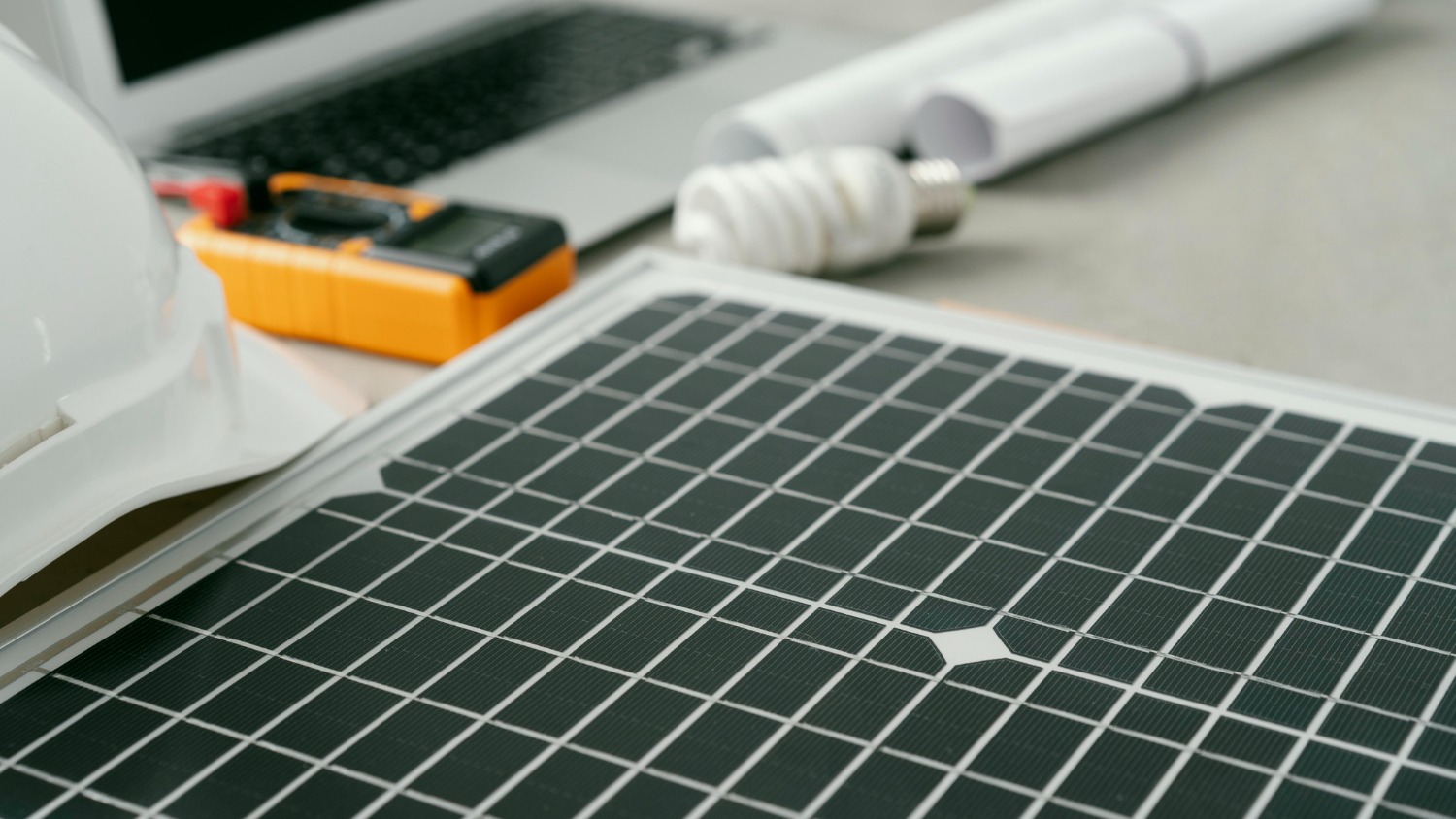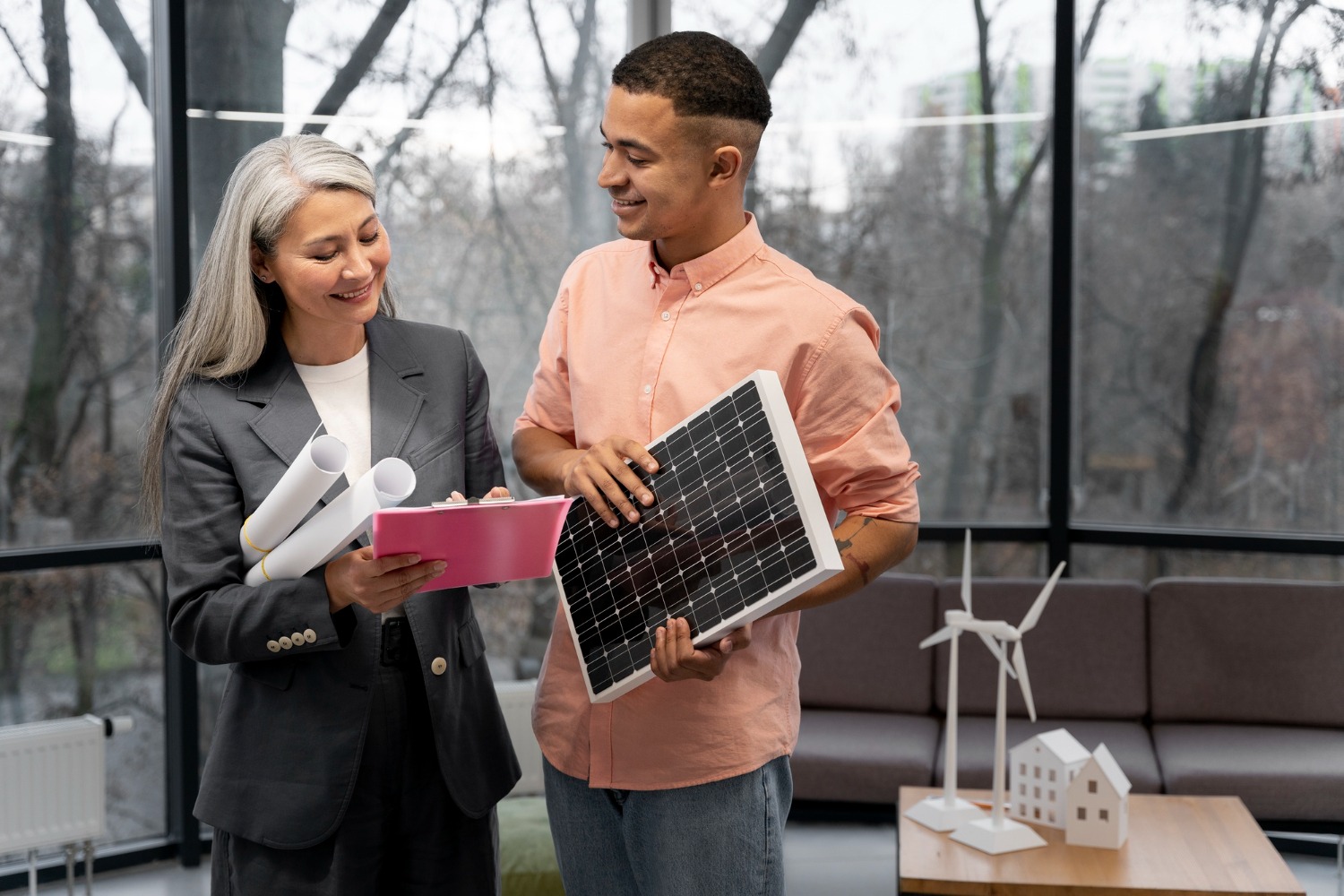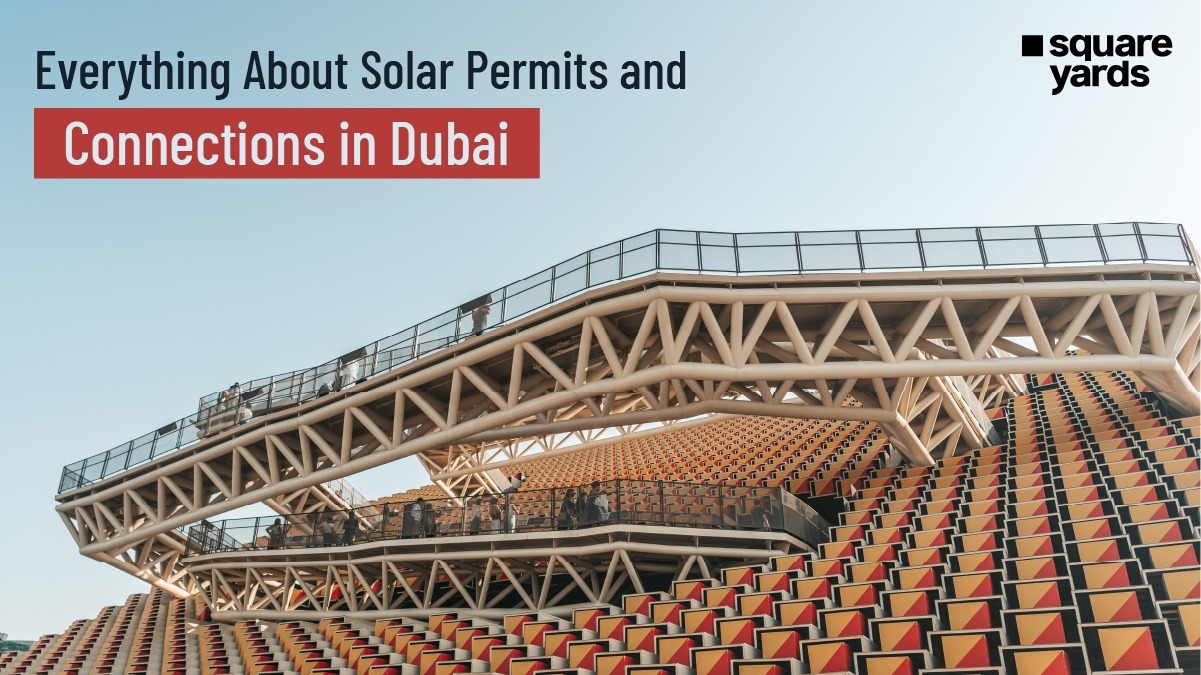Solar permits and connections in Dubai are required to install solar energy systems as per regulations by the Dubai Electricity and Water Authority (DEWA). Homeowners must work with licensed solar companies in Dubai to apply for permits. The procedure includes submitting several technical documentation about the solar system design, such as site plans and equipment requirements.
Once received, DEWA reviews the application; if approved, an inspection is scheduled within 11 days, after which the solar panel installation in Dubai can proceed, connecting the system to the grid. Obtaining a solar permit aligns with safety standards and integrates renewable energy into Dubai’s infrastructure to support sustainability goals.
What are Solar Permits and Connections?

Solar permits and connections are required to authorise the solar panel installation in Dubai. Homeowners must acquire DEWA approval through a qualified contractor, ensuring safety and efficiency standards are met. Contractors handle documentation and submit it to DEWA, which inspects the site upon approval. After inspection, the solar connection in Dubai links the system to the grid, enabling households to harness the solar energy Dubai provides.
-
Significance of Solar Permits
Solar permits in Dubai are essential to ensure the safety, compliance, and quality of solar panel installations. They help reduce electrical risks and guarantee the system’s compatibility with Dubai solar power grids. The detailed paperwork and inspection requirements enhance system quality and performance. Compliance with DEWA regulations also avoids potential fines and legal issues.
Key Regulatory Body: Dubai Electricity and Water Authority (DEWA)
DEWA is the primary regulatory organisation managing solar permits and connections in Dubai. Its role is to promote the use of renewable energy by ensuring that all solar panel installations in Dubai meet safety and quality standards.
When awarding solar permits in Dubai, DEWA reviews applications from households and solar enterprises to ensure that systems are compatible with the local energy infrastructure and fulfill set safety criteria.
DEWA supports solar adoption among property owners through initiatives like Dubai solar farm projects and incentives. It assists with documentation and inspections, working closely with certified contractors to uphold solar energy Dubai standards.
What are the Eligibility Criteria for Installing Solar Panels in Dubai?

Specific eligibility criteria must be met to ensure a successful solar panel installation in Dubai.
-
Property Requirements
To apply for solar permits in Dubai, an individual or company must privately own or lease the property. Furthermore, the property must be located within DEWA’s service region, allowing for solar system connections in Dubai.
Roof Space:
Adequate, unshaded roof space is essential for solar panel installation in Dubai. It must be clear of barriers such as tall buildings, trees, or other structures that could cast shadows on the panels. There must be enough space to accommodate the required panels to meet the property’s energy needs. DEWA normally needs a minimum amount of usable roof space to ensure that Dubai’s solar system generates enough energy.
Building Codes:
Following local building codes is essential for solar panel installation in Dubai. Property owners must ensure their roofs are strong enough to support solar panels and equipment. DEWA reviews these structural requirements during the solar permits process to confirm safety. Working with qualified solar companies in Dubai familiar with Dubai’s solar power rules helps homeowners meet all building codes for a compliant installation.
-
Individual or Company Ownership
To install solar panels in Dubai, the property must be owned or leased by an individual or registered company, as only authorised companies can apply for solar permits in Dubai. This assures the applicant the legal right to modify the property for solar energy systems. Adopting solar energy in Dubai supports the city’s environmental goals and CSR efforts among businesses. Thus, whether for personal or commercial usage, ownership is an important part of the solar installation process.
Steps for Obtaining Solar Permits
Many documents must be presented when applying for a solar permit in Dubai to ensure a smooth approval procedure. The following documents are required when applying for a solar license in Dubai:
-
Property Ownership Proof:
One of the significant documents required is the verification of property ownership, such as title deeds or a leasing agreement. Clear evidence of ownership is necessary since it establishes the applicant’s right to modify the property. This is a key criterion for obtaining solar permits in Dubai. This document is essential for homeowners and businesses wanting to install solar panels.
-
Building Plans:
The blueprints of the building plan should specify the property’s layout, including where the solar panels will be positioned. The design must adhere to local building laws and regulations to ensure safety and structural integrity. DEWA examines these plans to ensure that the proposed solar system in Dubai can be securely integrated into the existing building.
-
Technical Specifications:
Applicants must provide technical specifications for installing solar equipment, including information on solar panels, inverters, and other components. DEWA uses this information to determine the feasibility and safety of the proposed installation. Accurate technical specifications guarantee that the solar system satisfies performance standards and complies with Dubai solar power legislation.
Different Way to Submitting Solar Panel Installation Documents
Applicants for solar permits in Dubai can submit their documents through two main methods: online portal and in-person submission.
-
Online Portal
The online gateway offered by DEWA is the most convenient choice. It enables applicants to submit required documents, such as property ownership proof, building plans, and technical requirements, directly to DEWA. This strategy streamlines the application process, allowing quick evaluations and real-time status tracking. This approach is for people seeking solar permits in Dubai as it improves communication and minimises paperwork.
-
In-Person Submission
Alternatively, candidates can submit their documents at DEWA customer service locations. This option also enables a quick process by DEWA representatives, who can answer queries and explain requirements. While it may take longer, in-person submissions can be useful for those who want direct support.
Process of Approval and Inspection
Obtaining solar permits in Dubai involves several key steps. These include –
- Application Review: DEWA reviews submitted applications, including property documents, building plans, and solar system Dubai specifications, to check for compliance with safety and quality standards.
- Site Inspection: DEWA schedules a property inspection to verify adequate roof space, structural integrity, and alignment with submitted plans.
- Decision and Feedback: After inspection, DEWA either approves the installation, allowing work to begin or provides feedback if the application needs revision.
- Final Approval: Approval ensures the system aligns with DEWA’s standards, allowing property owners to integrate solar energy in Dubai.
Grid Connection Requirements and Process in Dubai
Connecting a solar system in Dubai to the grid requires compliance with technical and safety standards set by DEWA. These guidelines cover solar panel size, inverters, and components to ensure compatibility with Dubai’s solar power infrastructure and facilitate efficient energy transfer.
- Application Submission: For solar permits in Dubai, apply through DEWA with the required documents, technical specs, and safety compliance information.
- Approval Process: Once DEWA approves the documentation, solar panel installation in Dubai, including the necessary equipment, can proceed.
- Final Inspection: After installation, DEWA conducts a final inspection to confirm compliance with approved plans. Upon passing, the solar connection in Dubai is granted, allowing properties to access solar energy in Dubai.
This process ensures that solar permits and connections in Dubai meet DEWA’s standards, supporting safety and system reliability.
What is Net Metering in Dubai?
Net metering in Dubai enables solar panel owners to earn credit for surplus electricity generated and fed back into the grid. This technology lowers electricity expenses by offsetting the cost of power from the grid. Homeowners can benefit from cheaper energy expenses while supporting Dubai’s solar power projects, promoting sustainable energy use.
-
Eligibility Criteria
Property owners must install and connect a DEWA-approved solar system to the grid to qualify for net metering. The system must comply with the technical specifications and safety regulations. Furthermore, only individuals with genuine solar permits in Dubai can apply for net metering.
-
Application Process
After installing and activating the solar system, applicants submit their net metering request to DEWA, including proof of installation and technical specifications. Once approved, DEWA installs the metering equipment to track energy output and consumption, promoting the benefits of solar energy in Dubai.
Costs and Incentives for Installing Solar Panels
The costs of solar panel installation in Dubai depend on system size, equipment type, and installation complexity. The expenses include the cost of solar panels, inverters, labour, and any required permits. While initial costs may be high, Dubai solar panels offer significant long-term savings on electricity bills.
-
Government Incentives
The Dubai government offers various incentives to offset the cost of solar panel installation. These incentives can greatly lower the financial burden on homes and businesses that want to use renewable energy.
-
Shams Dubai Program
Through the Shams Dubai Program, residents benefit from net metering and financial incentives, earning credits for excess electricity returned to the grid. This makes Dubai’s solar system more accessible and financially attractive, promoting affordable solar solutions.
Factors To Consider Before Installing Solar Panels
The following factors are crucial to consider when installing solar panels at home or for business purposes in Dubai:
-
Maintenance and Repair:
When installing solar panels in Dubai, it is important to consider future maintenance and repairs. Regular maintenance ensures the solar system’s optimal performance and longevity. Property owners should schedule routine inspections and cleanings to avoid dust accumulation. Check warranty terms with manufacturers for future repairs.
-
Insurance:
Homeowners should consult their insurance providers to determine how solar panel installation in Dubai impacts their policy. It is essential to ensure that the solar system is sufficiently protected in the event of damage or theft.
-
Regulatory Updates:
Stay updated on DEWA rules and Dubai solar permit requirements. This will help you maintain compliance and allow you to benefit from programs like the Shams Dubai Program supporting renewable energy.
Conclusion
Investing in solar panels in Dubai allows households and companies to save money on energy and support sustainable energy projects. Property owners can make informed choices by understanding the process for acquiring solar permits and connections in Dubai. Programs like the Shams Dubai Program make solar energy adoption eco-friendly and cost-effective. Embrace this renewable resource to save money and contribute to a cleaner environment.
Similar Suggestions For You:
|
Explore Trademark Registration in the UAE |
|
|
Know About DEWA Clearance Certificate in Dubai |
|
|
About The New Instant Sale DLD Feature |
|
|
Urban Wonders of Dubai Municipality |
|
|
Understand DEWA Electricity Network Modification |
Frequently Asked Questions:
DEWA provides financial incentives such as net metering, which allows homeowners to sell excess electricity back to the grid, and green financing options through local banks.
Acquiring solar permits and connections in Dubai typically takes about 8 to 11 days.
Solar permit applications are free. However, after approval, charges arise, including installation fees and optional security deposits, which are about 10% of the system cost.
The cost of solar panel installation in Dubai depends on the system size, panel quality, installation complexity, and contractor fees, which can all impact installation costs.
While solar panels require minimal maintenance, there may be additional charges for cleaning, inspections, and repairs over time. Are any financial incentives or subsidies available for solar panel installations in Dubai?
How long does obtaining solar permits and connections in Dubai typically take?
What are the fees associated with obtaining a solar permit and connection?
What factors can affect the cost of solar panel installation in Dubai?
Are there any additional costs associated with maintaining solar panels?




